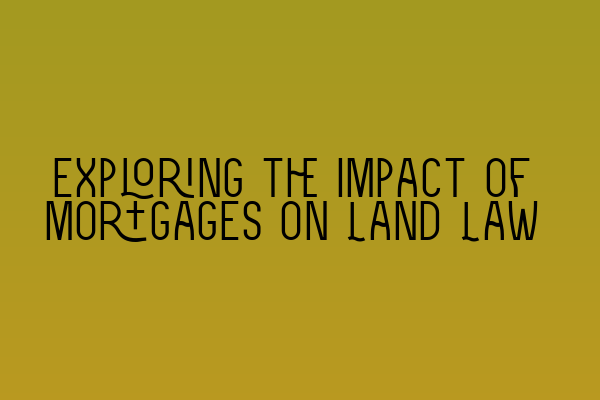Exploring the Impact of Mortgages on Land Law
At SQE Property Law & Land Law, we understand the importance of mortgages in the realm of land law. Mortgages play a critical role in the property market, allowing individuals to secure financing for the purchase of real estate. In this blog post, we will delve into the significant impact that mortgages have on land law, exploring the legal framework, rights, and responsibilities associated with this essential aspect of property ownership.
The Legal Framework of Mortgages
When an individual obtains a mortgage to purchase real property, they enter into a legally binding agreement with a lender. This agreement outlines the terms and conditions of the loan, including repayment schedules, interest rates, and any additional clauses specific to the mortgage contract. Parties involved in a mortgage transaction must adhere to the laws and regulations governing mortgages, ensuring adherence to land law principles.
Property Ownership Rights and Mortgages
While a mortgage allows an individual to secure financing and acquire property, it is essential to understand that the lender holds a legal interest in the property until the mortgage is fully repaid. This means that the homeowner possesses equitable ownership rights, while the lender has a legal interest in the property.
The legal interest held by the lender is known as a legal charge or a lien. It provides the lender with the right to enforce the repayment of the mortgage and potentially take possession of the property if the borrower defaults on their payments.
Transfers and Mortgages
Mortgages also have a significant impact on the transfer of property ownership. When a property subject to a mortgage is sold, the mortgage must be discharged or transferred to the new owner. The legal process of transferring the mortgage is known as a mortgage assignment and requires the involvement of all parties, including the lender, borrower, and the new owner.
During a property transfer, the lender may choose to release the existing mortgage and issue a new mortgage to the new owner. Alternatively, the lender may assign the existing mortgage to the new owner, who assumes the responsibility of making mortgage payments. This transfer of mortgage ensures that the lender’s legal interest remains protected while the new owner assumes the equitable ownership rights.
Remedies and Mortgage Default
In cases where a homeowner defaults on their mortgage payments, the lender has certain remedies available to them under land law. These remedies vary depending on the jurisdiction and the terms outlined in the mortgage agreement. Common remedies include foreclosure, where the lender takes possession of the property and sells it to recover the outstanding debt, or initiating a legal action to enforce repayment.
It is important for homeowners to understand the potential consequences of defaulting on their mortgage payments and seek legal advice to explore any possible alternatives or remedies to avoid losing their property.
Conclusion
Mortgages have a profound impact on land law, shaping property ownership rights, transfers, and the legal framework that governs the relationship between lenders and borrowers. Understanding the implications of mortgages on land law is vital for both homeowners and legal professionals operating in the property law sector.
If you’re interested in furthering your knowledge of property law and land law in preparation for your SQE exams, SQE 1 or SQE 2, check out our SQE 2 Preparation Courses and SQE 1 Preparation Courses. Stay updated with the latest SRA SQE Exam Dates to plan your study schedule effectively.
